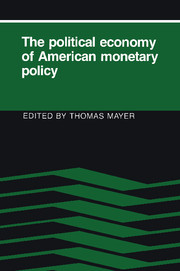Book contents
- Frontmatter
- Contents
- Preface
- List of contributors
- 1 Introduction
- 2 Studying the Fed: toward a broader public-choice perspective
- 3 The Federal Reserve reaction function: a specification search
- 4 Corporate profitability as a determinant of restrictive monetary policy: estimates for the postwar United States
- 5 Federal Reserve behavior since 1980: a financial-market perspective
- 6 The Federal Reserve and its institutional environment: a review
- 7 The political economy of monetary policy
- 8 Political monetary cycles
- 9 Congress and the Fed: why the dog does not bark in the night
- 10 The Federal Reserve as a political power
- 11 Monetary policy and political economy: the Federal Reserve and the Bank of Japan
- 12 A positive analysis of the policy-making process at the Federal Reserve
- 13 A theory of FOMC dissent voting with evidence from the time series
- 14 Explaining FOMC members' votes
- 15 Fed behavior and X-efficiency theory: toward a general framework
- 16 Minimizing regret: cognitive dissonance as an explanation of FOMC behavior
- 17 The discount window
- 18 Leaning against the wind: the behavior of the money stock in recession and recovery, 1953–8
- 19 Bureaucratic self-interest as an obstacle to monetary reform
- Index
6 - The Federal Reserve and its institutional environment: a review
Published online by Cambridge University Press: 06 July 2010
- Frontmatter
- Contents
- Preface
- List of contributors
- 1 Introduction
- 2 Studying the Fed: toward a broader public-choice perspective
- 3 The Federal Reserve reaction function: a specification search
- 4 Corporate profitability as a determinant of restrictive monetary policy: estimates for the postwar United States
- 5 Federal Reserve behavior since 1980: a financial-market perspective
- 6 The Federal Reserve and its institutional environment: a review
- 7 The political economy of monetary policy
- 8 Political monetary cycles
- 9 Congress and the Fed: why the dog does not bark in the night
- 10 The Federal Reserve as a political power
- 11 Monetary policy and political economy: the Federal Reserve and the Bank of Japan
- 12 A positive analysis of the policy-making process at the Federal Reserve
- 13 A theory of FOMC dissent voting with evidence from the time series
- 14 Explaining FOMC members' votes
- 15 Fed behavior and X-efficiency theory: toward a general framework
- 16 Minimizing regret: cognitive dissonance as an explanation of FOMC behavior
- 17 The discount window
- 18 Leaning against the wind: the behavior of the money stock in recession and recovery, 1953–8
- 19 Bureaucratic self-interest as an obstacle to monetary reform
- Index
Summary
Introduction
The Federal Reserve System is perhaps the most controversial nonelected element of the government of the United States. Journalists and voters vilify it, Congress and the president seek to dominate it, and scholars argue about it. Our focus is on the literature that considers the political accountability and responsiveness of the U.S. monetary authority. This body of work has undergone a clear evolution over time, going from a view of the Fed that took for granted its autonomy toward a perspective that debates the agency's independence and seeks to illuminate the avenues of political influence on it.
Because of the importance of the Fed in shaping monetary and overall economic policy, it is a powerful weapon. If political actors could gain control of it and learn how to use it effectively, there is little question that the executive, the Congress, and other external actors could better their own lot by providing useful service to grateful constituents. The question is, can political actors influence the Fed, and if so, how? The literature contains some hints that both the Congress and the executive have at least occasionally succeeded in influencing monetary policy, presumably to their electoral benefit. But these results are controversial, and the only real agreement to date is that there exists no consensus on their validity.
We shall not presume in this brief setting to describe at length the issues in this controversy or to take a position on them. Instead, our goal is to trace the evolution of scholarly work on the Federal Reserve's political accountability.
- Type
- Chapter
- Information
- The Political Economy of American Monetary Policy , pp. 81 - 96Publisher: Cambridge University PressPrint publication year: 1990
- 5
- Cited by



